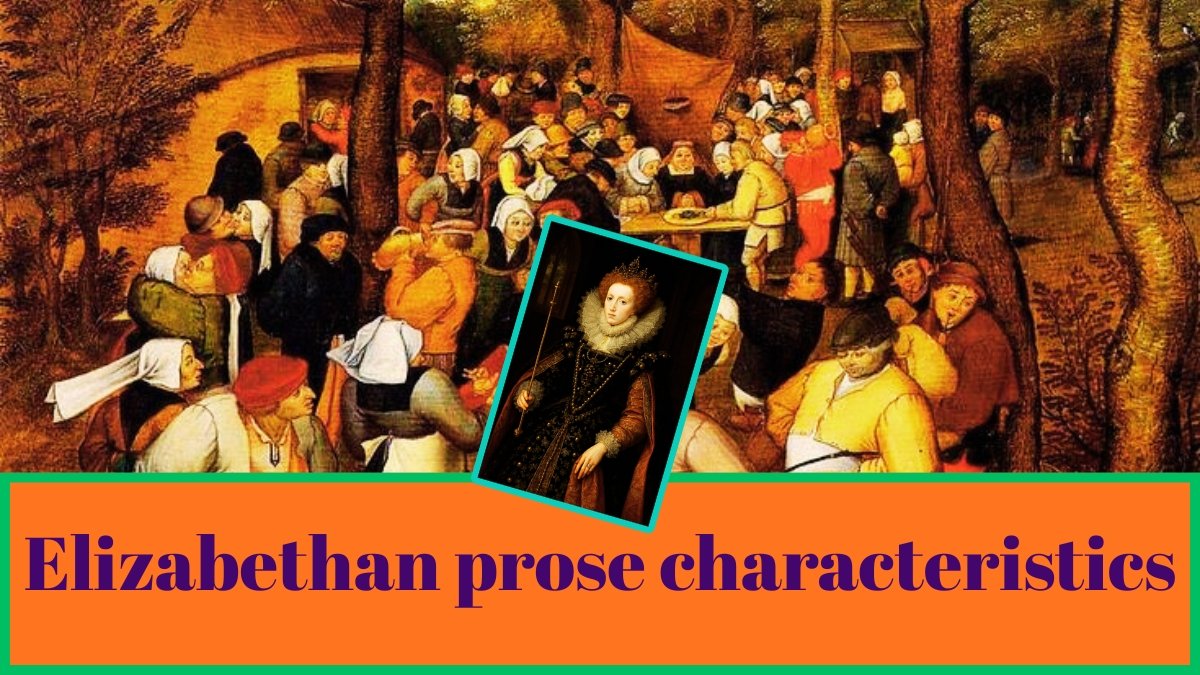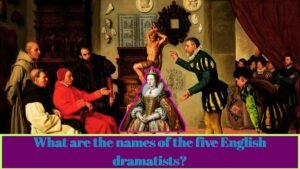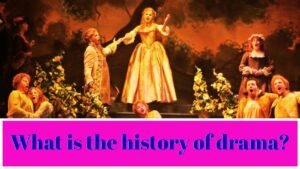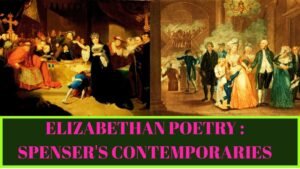Elizabethan prose characteristics.
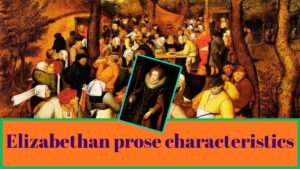
Elizabethan prose not so great as its poetry and drama-Prose translations before Spenser-Lyly’s Euphues-Its style-Sidney’s Arcadia-Other writers of fiction: Lodge, Greene, Nash, Deloney-The Pamphleteers: Martin Marprelate, Hooker, Bacon-Criticism: Sidney’s Apology for Poetry The craze for classical metres: Webb, Puttenham and Daniel-History: Hall, Holinshed, Stowe, Raleigh’s History of the World-Travel: Hakluyt, Purchas-The great translations: Plutarch’s Lives, Florio’s Montaigne.
The prose of the Elizabethan period is not so brilliant as its poetry or drama. Historically it reached in this period the middle stage of its development. In thought, diction and style it is nearer to modern times than the older prose, say the prose of Malory’s Morte d’Arthur. But still it is not modern prose. Poetry and romance were heavy in the air and clung to its prose. Thus most of the Elizabethan prose is poetic, and except in a few cases, coloured with romantic conceits. Again, stimulated as it was by foreign models-Classical, Italian, French and Spanish-made available through translations, much of this prose is rather juvenile, artificial and conventional. It is also, with very few exceptions, verbose. This was natural in the circumstances of the age. It was an age aboun-ding in vitality; the resources of the language had increased vastly through translations; what wonder that prose which is not subject to the restrictions of verse should overflow with words?
Among the translations before Spenser, the two that had most influence were North’s Golden Book of Marcus Aurelius (1557), and Painter’s Palace of Pleasure (1566-67). Painter’s book is a collec-tion of tales mainly from the classics and the Italian of Boccacio and Bandello. This proved a prolific source of plots to the Eliza-bethan dramatists including Shakespeare, who took from it the story of Romeo and Juliet. North’s Golden Book was a translation of The Dial of Princes written by a Spanish ecclesiastic, Guevara. A translation of a shorter version of this same book by Lord Berners had appeared as early, as 1534. Its highly elaborate, antithetical and epigrammatical style had an irresistible attraction for aristocra-tic circles and the book was reprinted many times. It was this book which is supposed to have inspired Lyly’s Euphues, the first great book of ornate prose in English.
Lyly
The first part of this book, Euphues, the Anatomy of Wit, appeared in 1579 followed by a second, Euphues and his England in 1580. It is a romance or romantic novel, if we are not too strict in using the term, for the novel proper was to come much later. Euplues, a rich and handsome Athenian youth visits Naples and there falls in love with Lucilla, the sweet-heart of his friend Philautus. The friends quarrel, but Lucilla jilts Euphues in favour of a third and very inferior suitor. The satire on women is obvious. For the rest, the book is didactic containing aphoristic reflections on educa-tion and morals. The second part is dedicated to ‘the ladies and gentlewomen of England’ who are highly praised for their beauty and virtue by by way of making amends for the attack on them in the first. Euphues now transported to England lavishes high praise on the country, her people, queen, and specially her universities.
Although the book has story interest, some realism, and a good deal of aphoristic wisdom, it was not its matter so much as its curious manner which fascinated Lyly’s contemporaries. The book was an immense and immédiate success and went through many editions during a very short time. Euphuism became a craze with court ladies and fashionable gentlemen, who vied with one another in repeating its fine phrases and conceits. Among others two tricks of its style are obvious. The first is balance in sentences secured by antithesis and alliteration; the second is a succession of fantastic comparisons-metaphors and similes drawn from fabulous animals, plants, and precious stones. It is this second characteristic which is peculiarly Lyly’s, for the first is found in other writers as well, though not so exaggerated as in him.
The far-fetched comparisons and fanciful images known as ‘con-ceits’ so appealed to the taste of the time that some of the greatest writers including Sidney and Shakespeare used them. Shakespeare’s earlier comedies have many conceits and word plays, though he parodied them in his later plays like Henry IV and Hamlet. It was Drayton who condemned Euphuism in the strongest terms and it soon fell into disrepute. The conceit, however, in its slightly changed meaning of a quaint, highly refined or intricate thought, continued to colour the literature of the post-Elizabethan period down to the Restoration, and appears in its more fantastic forms in the poetry of the ‘metaphysica)’ school.
Euphuism has its points-wit, sparkle, novelty and it is no wonder its appeal was so wide-spread. But to the more refined modern tastes its interminable and monotonous antithesis and parallels are tedious. The following extracts from Euphues will serve to illustrate its special flavour.
A Father’s Grief: Thou weepest for the death of thy daughter and I laugh, at the folly of the father, for greater vanitie is there in the minde of the mourner then bitternesse in the death of the deceased. But she was amiable, but yet sinful, but she was young and might have lived, but she was mortall and must have dyed. I(Ay) but hir youth made thee often merry, I but thine age shold once make thee wise. I but hir greene yeares wer unfit for death, I but thy hoary haires should dispyse life. Knowest thou not, Eubulus, that life is the gift of God, death the due of Nature; as we receive the one as a benefite, so must we abide the other of necessitie. Wise men have found that by learning which old men should know by experience, that in life ther is nothing sweete, in death nothing sowre.
(From Euphues, the Anatomy of Wit)
Continue not in Anger: Friendshippe should be like the wine which Homer, much commending, calleth Maroneum, whereof one pinte being mingled with five quartes of water, yet it keepeth his old strength and vertue, not to be qualified by any discurtesie. Where salt doth grow nothing els can breede, where friendship is built no offence can harbour.
(From Euphues and his England)
Although iron the more it is used the brighter it is, yet silver with much wearing doth waste to nothing: though the cammock the more it is bowed the better it serveth, yet the bow the more it is bent and occupied the weaker it waxeth: though the camomill the more it is trodden and pressed down, the more it spreadeth, yet the violet the oftener it is handled and touched the sooner it decayeth.
(From Euphues)
Though the stone Cylindrus at every thunder-clap roll from the hill, yet the pure sleek stone mounteth at the noise; though the rust fret the hardest steel, yet doth it not eat into the emerald; though polypus change his hue, yet the salamander keepeth his colour; though…yet…, though…yet…; though…yet…1
(From Euphues)
Sidney
Conceit of quite another kind was invented by Sir Philip Sidney in his Arcadia which though written about the same time as Euphues was published posthumously in 1590. Inspired by a Greek romance of Heliodorus of Syria, 3rd cent; author of Aethiopica, it is a pastoral romance which Sidney wrote as a pastime to entertain his sister, the Countess of Pembroke. It is a fantastic story of kings and courtiers, princes and princesses, in a land of enchanting pastoral beauty, the Greek Arcadia, a very paradise on earth. In this utopia the highest ideals of love, friendship, courage and knightly courtesy prevail. But again, as in the case of Euphues, it is the style which arrests attention. It is Euphuism with a difference, and may well be called Arcadianism. It is highly poetic, the poetry being height-ened by extra refinement or preciousness and the figure of speech called pathetic fallacy.
For example:
In Arcadia: There were hilles which garnished their proud heights with stately trees; humble valleis, whose base estate seemed comforted with the refreshing of silver rivers; medows, enameld with al sorts of ey-pleasing floures; thickets, which being lined with most pleasant shade, were witnessed so to by the cheer-ful deposition of many wel-tuned birds; each pasture stored with sheep, feeding with sober security; while the prety lambs with bleting oratory craved the dams comfort; here a shepheards boy piping, as though he should never be old; there a yong shepherdesse knitting, and withal singing; and it seemed that her voice comforted her hands to work, and her hands kept time to her voices music.
(Book 1, chap. 2)
Its poetic quality is undeniable and ‘arcadianism’ influenced mostly poets the love-poets, sonneteers, and the metaphysicals. But it is much too involved and slipshod for prose. It is as artificial as Euphuism though a little less tiring. It was only the sweet memory of the writer that preserved its vogue a little longer. On the whole both the Euphues and the Arcadia are curiosities of literary history, for they made no significant contribution either to prose style or to fiction.
Other Writers of Fiction
Lodge, Greene, Nash, Deloney. Sterile as both Lyly and Sidney were as novelists, some advance in story-telling was made by Lodge and Greene, both imitators of Lyly. Lodge’s romance Rosalynde which was actually described in its subtitle as Euphues’ Golden Legacy supplied the plot to Shakespeare’s As You Like It, and Greene’s Pandosto to that of The Winter’s Tale. But real advance in the art of fiction was made by Nash whose picaresque romance Jack Wilton or The Unfortunate Traveller is regarded by some as the first Elizabethan novel. The picaresque novel or novel dealing with the adventures of a rogue (from picaro, a rogue) originated in Spain. Nash’s book narrates the adventures of Jack Wilton, a page in the army of Henry VIII, with a surprising wealth of realis-tic incident and in a style at once racy, witty and humorous. It is a complete departure from the euphuistic romances of Lodge and Greene and is altogether the most delightful thing in Elizabethan fiction.
Curiously enough, however, Nash was surpassed in popularity by a much less gifted writer, Thomas Deloney. His stories, Jack of Newbury, Thomas of Reading, The Gentle Craft, are more in line with the later novel of the eighteenth century than those of his greater contemporaries. The secret lies in his subjects as well as in his style. Instead of dealing with the far-fetched or exotic he concentrated on English life and depicted it in a plain, natural style. He was a weaver by trade and kept close to the life of the artisan. His Gentle Craft, which is all about shoemakers, is the most famous of histories and supplied the plot for Dekker’s Shoemaker’s Holiday.
The Pamphleteers
A form of prose writing that was peculiar to the time was the pamphlet. Pamphlets were written on all kinds of subjects and were specially used in controversies-literary, religious and political. The most famous of these, the Martin Marprelate controversy, centred round episcopacy or government of the Church by bishops. The Puritans were opposed to the institution of bishops and an anonymous champion of their cause who called himself Marprelate published a series of pamphlets containing ribald attacks upon episcopacy. The bishops replied in the same terms enlisting on their side such gifted writers as Lyly, Greene, Lodge, and above all, Nash, the most vigorous pamphleteer of the time. The controversy which began in 1588 ended with the seizure of the secret press of the Martinists and the hanging of one Penry in 1593, but the identity of Martin remains a mystery to this day.
Hooker. It was an unseemly controversy and is of little literary interest except in so far as it exercised the powers of English prose in the language of broad satirical humour and invective. But it had one important result. It provoked Richard Hooker, a country divine, to write his monumental book Of the Laws of Ecclesiastical Polity. It is a sober, dignified and closely reasoned defence of the church of England and its episcopal government. It is not mere theology: it is theology broad based on philosophy. The Puritans objected to episcopacy on the ground that it had no sanction in the scripture. To this Hooker replied that the scripture does not, cannot, provide for all matters and God’s word has to be supple-mented by reason in matters not covered by it. His is a plea for tolerance, understanding and freedom. The Puritan’s literal inter-pretation of the Bible would tie the Christian hand and foot and make the church regulate not only the religious life of the people but their civil life as well. The Puritan position implied the subor-dination of the king and civil authority to the church, which would be a tyranny too terrible to contemplate.
Hooker’s book is an object lesson in religious controversy. He conducts his argument on a burning question with a quiet, grave eloquence unprecedented in the controversies of the Reformation. True religion and philosophy had found in him an advocate of first rate literary power. His language is simple yet scholarly, and his sentences though long have a subdued poetic rhythm. His book remains a standard work of the ology and is at the same time a classic of English prose.
Bacon (1561-1626). While few people today read Hooker’s theo-logical work, every student has to read Bacon’s Essays. The first edition published in 1597 contained ten essays which were enlarged later to fifty eight. The Essays are what Bacon calls them in the sub-title ‘Counsels, civil and moral’. They are full of practical wisdom designed to help in the successful conduct of life. It is frankly worldly wisdom without any pretence of idealism. Indeed the advice at places is plainly Machiavellian. For example, in his essay ‘Of Simulation and Dissimulation’ he says: “Besides (to say truth) nakedness is uncomely, as well in mind as body; and it addeth no small reverence to men’s manners and actions, if they be not altogether open. The best composition and temperature is to have openness in fame and opinion; secrecy in habit; dissimulation in seasonable use; and a power to feign, if there be no remedy”. No wonder this purveyor of worldly wisdom and apostle of success, who had risen to the high office of Lord Chancellor, was convicted of bribery and embezzlement. The faults of his character, however, should not blind us to his merits as a writer. He was a practical psychologist with a sound knowledge of human nature, and this is observable everywhere in his essays. But it is their style even more than their matter which makes these essays so memorable. The essays are in the form of short pithysayings or maxims, each of which may itself be expanded into an essay. Many of his state-ments sound like proverbs. For example: “What is truth? said gesting Pilate; and would not stay for an answer.” “Revenge is a kind of wild justice.” “He that hath wife and children hath given hostages to fortune.” fortune.” “Prosperity is the blessing of the Old Testa ment; adversity is the blessing of the New.””Prosperity doth best discover vice, but adversity doth best discover virtue.” “A crowd is not company. “Reading maketh a full man; conference a ready man, and writing an exact man.”
Such weighty sentences are scattered throughout the Essays and are supported by quotations from the ancients mostly Latin. He also uses words in their Latin meaning and his sentences are marked by balance and antithesis. The title, Essays, may have been suggest-ed by Montaigne’s Essais which had appeared as early as 1580, though not translated into English till 1603. There is, however, no similarity between the two. The Frenchman is pre-eminently per-sonal and discursive while Bacon is impersonal and aphoristic. There is only one essay of Bacon’s, that on Gardens, which is personal and reveals his delight in gardens: “God Almighty first planted a Garden.”
A minor literary work of Bacon’s is the New Atlantis. It is just another Utopia, which describes an imaginary island in the pacific inhabited by scholars and scientists. The most interesting feature of this island is ‘Solomon’s House’ which is dedicated to the pursuit of scientific research. The book which was published incomplete after Bacon’s death is really an offshoot of his philosophical speculations. His principal philosophical works are the Advancement of Learning in English and the Novum Organum in Latin. In the Advancement of Learning the author discusses the various methods of advancing knowledge which he divides into history, poetry, and philosophy. In Novum Organum he expounds the inductive method of acquiring accurate knowledge, the method, that is to say, of observation and experiment and proceeding from the particular to the general. Thus Bacon may be said to have laid the foundation of modern science, though this is only grudgingly acknowledged, if not alto-gether denied.
Literary Criticism
There was little criticism in the Middle Ages. The earliest critical work was Wilson’s Art of Rhetoric (1553) to which reference nas already been made. In the great Elizabethan period quite a number of critical works appeared, the most important of which is Sidney’s Apology for Poetry. They have no originality, being based on Italian and French critical literature which was itself derived from the ancients. In a very uncritical fashion they uphold @lassical theories regardless of their suitability to the national genius. The writers contradict themselves in actual practice. The questions that most concerned the critics were morality and classical metres. Stephen Gosson who had failed as a dramatist attacked all poetry and plays in his School of Abuse (1579) This puritan attack provoked Sidney’s Apology for Poetry which, though written immediately after Gosson’s attack, was published after his death, in 1595. This is an eloquent and delightful defence of poetry and ranks with Shelley’s later essay on the same subject. The poet, says Sidney, is a maker, a creator, Nature’s only and superior rival. For Nature’s world is ‘brazen’, ‘the poets alone deliver a golden’. ‘He cometh unto you with a tale which holdeth children from play, and old men from the chimney-corner’. Of the ballad of Chevy Chase he says: ‘I never heard the old song of Percy and Douglas that I found not my heart stirred as with a trumpet’.
In his general attitude to literature Sidney is a classicist. He defends the ‘unities’ of classical drama and condemns the mixture of tragedy and comedy in contemporary romantic drama. He denounces artificial ornaments of style in his contemporaries and thus contradicts and condemns his own practice in the Arcadia. The Apology is written in simple, straightforward prose so unlike that of the Arcadia. It is one of the most delightful things in Elizabethan prose.
The other question that dominated criticism was that of adopting classical metres in English poetry. It was an exercise in futility, but it held in its grip the best brains of the time. Sidney, Spenser, Gabriel Harvey, and so many others toyed with the idea which developed into a craze. Webb’s Discourse of English Poetry (1586) and Puttenham’s much larger work, the Art of English Poetry (1589) deal with this question Campion, the song writer, forgetting his own songs denounced rhyme in his Observations in the Art of English Poetry (1602). This provoked Daniel to write his Defence of Rhyme (1602), a sound and mature critical work which put an end to the craze for introducing classical metres into English poetry.
Historical Literature
The patriotic impulse of the period produced many chronicles such as those of Hall, Holinshed, and Stowe. They are mere catalogues of events written in ornate style of little distinction. Holinshed’s Chronicle (1578-1586), the most popular of all, is of interest because it was used by Shakespeare for his plays. The only noteworthy historical work is Raleigh’s History of the World which though incomplete and unequal makes the first attempt in English at a philosophical survey of events. It is written in moderately ornate and forceful style and contains some passages of splendid eloquence including the famous one on death-
O eloquent, just and might Death! Whom none could advise, thou hast persuaded; what none hath dared thou hast done; and whom all the world hath flattered, thou only hast cast out of the world and despised; thou hast drawn together all the far-stretched greatness, all the pride, cruelty, and ambition of man, and covered it all over with these two narrow words, Hic jacet.’ (here lies……)
Literature of Travel
The same patriotic feeling that produced the chronicles was also responsible for the literature of travel. Touched to the quick by the French jibe that the English played safe in every venture, Richard Hakluyt, chaplain to the English Ambassador in France, determined to wipe off this national reproach. He collected all reports of English adventurers on the high seas and published his famous compilation with the lengthy title-The Principal Navigations, Voyages and Discoveries of the English Nation made by Sea or Over Land to the most remote and farthest distant quarters of the earth at any time within the compass of these 1500 years (1589). This work in three volumes is the most comprehensive account we have of English voyages of discovery and exploration. Hakluyt’s work was continued in the next reign by Samuel Purchas in his Hakluytus Posthumus or Purchas His Pilgrims (1625).
Translations
No survey of Elizabethan prose would be complete without reference to the work of translators who opened the riches of the ancient and modern literatures to English eyes. The most scholarly as well as the most prolific translator of the age was Philemon Holland. He went straight to his originals and translated Livy, Pliny (the Elder), Plutarch’s Moralia and Suetonis. But the most famous and by far the most popular translations are Plutarch’s Lives of the Noble Grecians and Romans (1579) by Sir Thomas North, and Montaigne’s Essays (1603) by John Florio. The English of these two translations, specially that of the Lives is so fluent, idiomatic and vigorous that they read like original masterpieces. This and their content made them the most popular reading of their day. Shakespeare used North’s Plutarch for his Roman plays and borrowed not only the stories but sometimes the very words. The irresistible charm of Montaigne inspired the writing of the personal essay which in the eighteenth century was established as a new form of prose literature.
